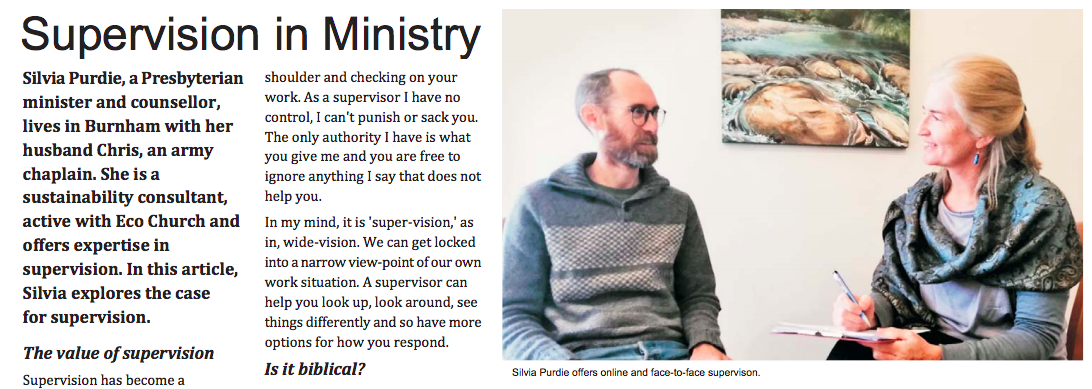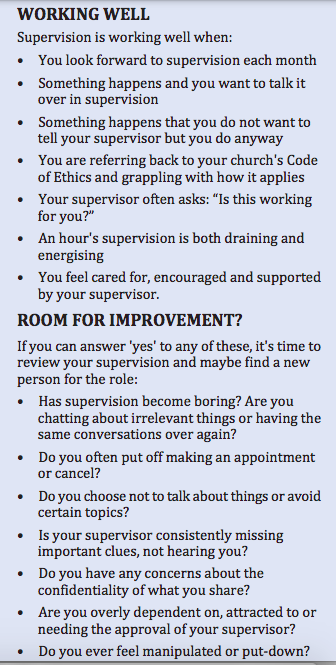Why have Supervision?
Excellent resources on professional supervision for nurses by Te Pou: 'Te Tirohanga a te Mana: Professional Supervision Guides', view HERE
Article 'Supervision in Ministry' in Touchstone, July 2021, view HERE
The value of supervision
Everyone in ordained or lay ministry roles must have professional supervision. This means going every month to talk about your work for an hour with someone quite outside your church. Each session costs the church approx $100 (even up to $150) every month - is this a good investment?
Supervision has become a requirement ‘across the board’ in people-professions such as counselling and youth and social work. It is seen as crucial for keeping ourselves safe, and keeping those we work with safe.
Methodist Mission Resourcing Director Siosifa Pole believes that supervision “will improve your ministry”. It is for the wellbeing of both the presbyter and the church, for “your health, and also the health of the church you look after.” Siosifa explains that what happens in supervision is that “you share your experiences in your ministry and unload your stress and anxiety, in a place that is quite confidential. The supervisor can give their opinion to you, to assist you to do better. Professional feedback is important.”
Mentoring and professional support are important in any field of work, or volunteer work. Anyone can go to a supervisor or life coach.
Super-Vision
We don’t like the image of someone looking over our shoulder checking on our work! But professional supervision is not a ‘power-over’ relationship. As a supervisor I have no control, I can’t punish or sack you. The only authority I have is what you give me, and you are free to ignore anything I say that doesn’t help you.
In my mind it is “super-vision”, as in, wide-vision. We can get locked into a narrow view-point of our own work situation, and a supervisor can help you look up, look around, see things differently and so have more options for how you respond.
Is it biblical?
One of Paul’s favourite words is “encouragement”, like when he send Tychicus to the Colossian so that he “may encourage your hearts” (Colossians 4:7). I love this word too, and to me it’s the point of supervision. We all need to be en-couraged. Heaven knows we get plenty of discouragement! Encouragement is not just a limp pat on the back with empty compliments. It is growing courage, both through positive affirmation but also through active challenge. Both sides are equally important; as a supervisor I look for every strength, to build up skills and talents, and I look for the learning edge.
Another core Bible principle is righteousness. God charged Abraham to “keep the way of the Lord by doing righteousness and justice” (Genesis 18:19). These days we call this ‘ethical practice’ which enables ‘right relationships’ with each other, with God, and especially with those vulnerable people God has given us to care for. Supervision upholds ethics and ‘right relating’ and calls us out when we are putting this at risk.
Who can I go to for supervision?
Churches are ‘raising the bar’ as to who can provide supervision. The Presbyterian Church used to allow for collegial supervision, but a recommendation coming to this year’s General Assembly will insist that supervision must be external and qualified. We are coming to the conviction that actually it’s not OK to just chat with your mate, because a mate cannot call you out on ethical challenges. Let’s take our calling seriously.
Church bodies, such as presbyteries and Mission Resourcing, keep lists of suitable people, as do counselling and social work bodies. Online supervision can be a good option, especially if you are not in a main centre.
As well as general ministry supervision, it can be excellent professional development to focus on an aspect of your ministry. Don’t be afraid to take a break from your regular supervisor and have some months of specialist supervision, such as cross-cultural supervision, or coaching on conflict resolution.
Everyone in ordained or lay ministry roles must have professional supervision. This means going every month to talk about your work for an hour with someone quite outside your church. Each session costs the church approx $100 (even up to $150) every month - is this a good investment?
Supervision has become a requirement ‘across the board’ in people-professions such as counselling and youth and social work. It is seen as crucial for keeping ourselves safe, and keeping those we work with safe.
Methodist Mission Resourcing Director Siosifa Pole believes that supervision “will improve your ministry”. It is for the wellbeing of both the presbyter and the church, for “your health, and also the health of the church you look after.” Siosifa explains that what happens in supervision is that “you share your experiences in your ministry and unload your stress and anxiety, in a place that is quite confidential. The supervisor can give their opinion to you, to assist you to do better. Professional feedback is important.”
Mentoring and professional support are important in any field of work, or volunteer work. Anyone can go to a supervisor or life coach.
Super-Vision
We don’t like the image of someone looking over our shoulder checking on our work! But professional supervision is not a ‘power-over’ relationship. As a supervisor I have no control, I can’t punish or sack you. The only authority I have is what you give me, and you are free to ignore anything I say that doesn’t help you.
In my mind it is “super-vision”, as in, wide-vision. We can get locked into a narrow view-point of our own work situation, and a supervisor can help you look up, look around, see things differently and so have more options for how you respond.
Is it biblical?
One of Paul’s favourite words is “encouragement”, like when he send Tychicus to the Colossian so that he “may encourage your hearts” (Colossians 4:7). I love this word too, and to me it’s the point of supervision. We all need to be en-couraged. Heaven knows we get plenty of discouragement! Encouragement is not just a limp pat on the back with empty compliments. It is growing courage, both through positive affirmation but also through active challenge. Both sides are equally important; as a supervisor I look for every strength, to build up skills and talents, and I look for the learning edge.
Another core Bible principle is righteousness. God charged Abraham to “keep the way of the Lord by doing righteousness and justice” (Genesis 18:19). These days we call this ‘ethical practice’ which enables ‘right relationships’ with each other, with God, and especially with those vulnerable people God has given us to care for. Supervision upholds ethics and ‘right relating’ and calls us out when we are putting this at risk.
Who can I go to for supervision?
Churches are ‘raising the bar’ as to who can provide supervision. The Presbyterian Church used to allow for collegial supervision, but a recommendation coming to this year’s General Assembly will insist that supervision must be external and qualified. We are coming to the conviction that actually it’s not OK to just chat with your mate, because a mate cannot call you out on ethical challenges. Let’s take our calling seriously.
Church bodies, such as presbyteries and Mission Resourcing, keep lists of suitable people, as do counselling and social work bodies. Online supervision can be a good option, especially if you are not in a main centre.
As well as general ministry supervision, it can be excellent professional development to focus on an aspect of your ministry. Don’t be afraid to take a break from your regular supervisor and have some months of specialist supervision, such as cross-cultural supervision, or coaching on conflict resolution.
Bad SignsIf you can answer ‘yes’ to any of these, it’s time to review your supervision, and maybe find a new one:
• Has supervision got boring?! Are you chatting about other things, or having the same conversations over again? • Do you often put off making an appointment, or cancel? • Do you choose to not talk about things, or avoid certain topics? • Is your supervisor consistently missing important clues, not hearing you? • Do you have any concerns about the confidentiality of what you share? • Are you overly dependent on, attracted to, or needing the approval of, your supervisor? • Do you ever feel manipulated or put-down? |
Good SignsSupervision is probably working pretty well when:
• you look forward to supervision each month • something happens and you want to talk it over in supervision • something happens that you don’t want to tell your supervisor, but you do anyway! • you are refering back to your church’s Code of Ethics and grappling with how it applies • your supervisor often asks you: “Is this working for you?” • an hour’s supervision is both draining and energising • you feel cared for, encouraged and supported by your supervisor. |

